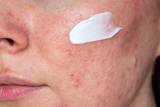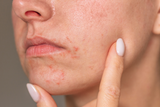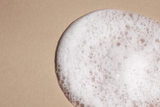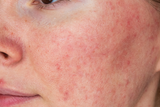Easy Peasy You
What you should pay attention to when it comes to active ingredients
Posted by Lara Schimweg on
Many skin care products on the market promise wonderful effects
The beauty industry tells you every day how many active ingredients your skin needs to stay healthy and soothed in the long term: anti-aging, tightening wrinkles, refining pores. Is that really healthy?
There are definitely some active ingredients that can have a positive effect on the skin. However, you don't have to believe every advertising promise. The promises are often exaggerated. Many active ingredients are only suitable for very specific skin problems and are definitely not an all-round solution for everyone. Some active ingredients can potentially contribute to healthier skin in the long term if you choose products carefully. Similar to medications, which are not equally suitable for everyone.
Always remember: Many active ingredients can irritate the skin or trigger allergies. In this and the next part you will find out what you can pay attention to, because sensitive skin in particular can be very irritated by potent active ingredients such as niacinamide or fruit acids, resulting in redness or pustules.
If you take too much care of your skin or use the wrong products, what is known as “over-care” can occur. With sensitive skin, such as rosacea and atopic skin in general, the skin is overwhelmed more quickly. However, even for people with more robust skin, too much care can simply be too much. An example is perioral dermatitis , the so-called “stewardess disease”: It often occurs in people who have used a lot of cosmetic products. Redness and pustules form on the face. Usually a small area remains free around the mouth. This is a very clear sign of perioral dermatitis. Unfortunately, perioral dermatitis can easily lead you into a vicious circle if you try to get the skin problem under control with other powerful skin care products. Usually only consistent omission helps - the so-called zero therapy . So the most radical form of skin minimalism. Here, less is definitely more.
In any case, it's better if you don't overdo it with skin care right from the start. If you have few ingredients in your skin care, you can also keep track of things better. An average cream can contain 40 ingredients or more. If you use this cream and your skin turns red, it's almost impossible to figure out which ingredient was responsible. Or maybe it was the interaction of several ingredients. And if you use even more products it becomes even more confusing. Of course, the same applies the other way around: you don't know what irritates your skin or what is good for it. If you are allergic, it is even more important to use few ingredients, as the risk of an allergic reaction increases with each additional ingredient.
Particularly with potent active ingredients, caution is advised for another reason: the so-called cocktail effect can lead to undesirable interactions between several substances.
Skin-identical active ingredients
Among all the active ingredients, we'll start with the ones that are very good for your skin. The best ingredients are those that occur in the skin or that are very similar to the substances in your skin. They ensure that your skin is soothed, well moisturized and protected in the long term. These include moisturizers such as hyaluronic acid, glycerin, sugar or salts. They provide your skin with the moisture it needs. Body-like fats ensure that moisture remains in your skin. These can be, for example: caprylic/capric triglycerides or squalane . Ceramides are particularly suitable for very dry skin. These skin-like active ingredients are uncomplicated and can be combined with each other without having to worry about a harsh interaction.
Plant extracts
Certain mild plant extracts can also soothe your skin. They usually contain a lot of antioxidants. Liquorice root extract has a natural anti-redness effect, green tea extract has an anti-inflammatory effect and black tea has a soothing effect on the skin. They can be easily combined with each other and are well tolerated insofar as there are not too many of them.
However, if the plant extracts sound too exotic, it is advisable to be more careful because they could potentially trigger a contact allergy. This danger always exists if your body is not yet familiar with the substance. Many exotic plant extracts are advertised in trendy skin care products as “superfoods” or true miracle plants. If you have no experience with such plants, take it slowly. Allergies can develop even if you didn't have them before. Especially if you are allergic to grasses, flowers and plants, always check whether you can tolerate the product. You can test this in the crook of your arm or on your wrist. An article with skin care tips for allergy sufferers is in the works. If you don't want to miss an article, subscribe to our articles at the bottom of the page via email or follow us on Instagram or Twitter. It's best to use compatible, well-known extracts that are just as good for the skin and less likely to cause allergies.
There are also herbal extracts that can have a wonderful natural effect on the skin, but can also cause an allergic reaction. Salix Alba Bark Extract is obtained from willow plants. It has a mild effect on impurities. Unfortunately, willow is one of the allergenic plants. If you are allergic, you may react to such extracts.
Also avoid the so-called witch hazel (Hammamelis Virginiana (Witch Hazel) Extract). Due to the manufacturing process, the extract contains essential oils and drying alcohol. As with rose water, these substances are not visible in the INCI list.
Tea tree oil also contains drying alcohol and essential oils. Unfortunately, the myth that tea tree oil works well against pimples has persisted for a long time. Although the alcohol actually dries out pimples, the natural essential oils can increase inflammation and attack the skin barrier. Alternatively, you can use products with green tea extract or zinc .
Potent active ingredients
If you want to do more because you are hoping for more potent active ingredients, you should consider the following:
Potent active ingredients such as niacinamide, vitamin C, pure salicylic acid, retinol, acid peels, etc. trigger a desired, active stimulus on your skin.
It is often recommended to use active ingredients that are as potent as possible to address certain problems or to prevent wrinkles.
Potent vitamin C is wonderful for strengthening the skin. However, not all sensitive skin can tolerate ascorbic acid (pure vitamin C). How tolerated ascorbic acid is also depends on the pH value and whether it is dissolved in water or fat. Products in which vitamin C is dissolved in oil are milder. It may be that you tolerate the milder vitamin C derivatives (descendants) better.
Every skin has a few pimples and inflammations on some days. Because our skin is a living organ that reacts sensitively to stress, weather and the body's hormones. A healthy, balanced diet also ensures that your skin develops less inflammation. An article on a healthy, balanced diet is in the works.
If it's just a few pimples, it makes sense to simply treat them with a little zinc . Just make sure that your little pimple helper does not contain any drying alcohols or essential oils. These only fuel inflammation unnecessarily. That's why you should leave these out.
Small inflammations usually go away on their own after a few days. Our skin can usually get small pimples under control without help. You will help her much more if you simply leave out the irritating and strong substances. The best recipe is calmness and healthy, calm skin care.
However, if you have very deep and large impurities, it may make sense to see a dermatologist to rule out acne vulgaris.
Benzoyl peroxide kills acne bacteria and targets the inflamed pimples. Unfortunately, for some skin types it also dries out the skin very much. Benzoyl peroxide is often used to treat acne. Find out more in detail beforehand. Concentrations that are too high belong in the hands of dermatologists. The same applies here: ask yourself whether you really need it.
You can treat impurities and inflammation with niacinamides . They can strengthen the skin barrier, reduce redness and ensure that you lose less moisture. Niacinamides can also regulate sebum.
Many people can tolerate niacinamide and allergies are extremely rare. They are considered well tolerated up to a concentration of 5%. However, above 5% the effect can also be reversed. The active ingredient is usually well tolerated. But there are a few things you should keep in mind about niacinamides.
Retinol prevents wrinkles. However, it is such a strong active ingredient that it can dry out the skin significantly. Retinol should not be used during pregnancy as it may harm the unborn child. A very potent ingredient.
Dealing with potent active ingredients
Only you can decide whether your skin really needs all the active ingredients. If you have sensitive skin, it is usually better to avoid potent active ingredients, even though many brands advertise their products rich in active ingredients as mild or sensitive. Even insensitive skin can develop over-cared skin due to too much skin care and, above all, too many different active ingredients, which could result in perioral dermatitis . Then only the radical step of zero therapy will help.Always ask yourself whether your skin actually needs the active ingredient. Because if you care for your skin gently, with what it really needs, it will recover in the long term, similar to a healthy diet
If you want to try active ingredients and acid peeling, always start with very low concentrations and please do not use the skin care products daily at the beginning. Add one new, potent ingredient to your skincare routine at a time to see how your skin reacts. Your skin should have the chance to get used to this new stimulus. You can't run a marathon overnight without getting your endurance, muscles and ligaments used to this intense strain. Give your skin time. Always find out more about the active ingredients and how to use them correctly before incorporating them into your routine. Because as you have seen, there are a lot of things to consider. The positive effects of potent active ingredients would be reversed if you use them incorrectly. Articles on the individual active ingredients will appear here in the future.
Mild is not always mild
Many cosmetic brands advertise active ingredients and at the same time particularly good tolerability. Some people tolerate such products quite well. And there are also products that actually do not contain fragrances and drying alcohols. However, potent active ingredients such as ascorbic acid ( vitamin C ), retinol, niacinamide or natural fruit and flower extracts are suddenly hidden in the normal day cream. These products may be too much for sensitive skin. It may be that you have bought a mild cream and are unsuspectingly caring for your skin with a variety of different active ingredients. If your skin doesn't tolerate this, it can lead to redness and inflammation. You're probably wondering how a sensitively advertised product can trigger something like this.And what about natural active ingredients in natural cosmetics or clean beauty?
By the way, this is not only the case in conventional cosmetics: also in clean beauty and that Natural cosmetics There are products that seem to be particularly mild and very suitable for sensitive skin. And many of these products also contain potent active ingredients, such as ascorbic acid or retinol.Just because an ingredient is natural doesn't mean it's necessarily milder.
- Tags: Allergie, Hautpflege, Periorale Dermatitis, Pickel, Rosacea
← Older Post Newer Post →
0 comments







